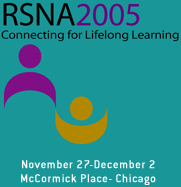
Abstract Archives of the RSNA, 2005
Jong-Young Oh, Presenter: Nothing to Disclose
Kyung-Jin Nam, Abstract Co-Author: Nothing to Disclose
Jong Cheol Choi, Abstract Co-Author: Nothing to Disclose
Jin-Han Cho, Abstract Co-Author: Nothing to Disclose
Ki-Nam Lee MD, PhD, Abstract Co-Author: Nothing to Disclose
Byeong-Ho Park, Abstract Co-Author: Nothing to Disclose
Sun-Seob Choi MD, Abstract Co-Author: Nothing to Disclose
Tae-Ho Hwang, Abstract Co-Author: Nothing to Disclose
et al, Abstract Co-Author: Nothing to Disclose
Recombinant vaccinia virus(rVV) has been well developed as a gene delivary vector and a number of clinical trials using rVV as vaccines have shown promising results for treating cancer. To our knowledge,a experiment using US guided injection of rVV in rabbit hepatoma has not been previously reported.The purpose of this study was to evaluate the anti-tumoral effect using rVV( Thymidine kinase(-)/ GM-CSF(+)) in a rabbit model of hepatic VX2 carcinoma.
VX2 carcinoma was implanted in livers of 12 rabbits. Ultrasonography was performed to detect hepatic mass at every week interval after implantation of VX2 carcinoma. CT was checked just after tumor detection on US. US guided injection of rVV(109 pfu/ml concentration) was preformed in three rabbits, intravenous(IV)injection of same dose of rVV was done in two rabbits, and another seven rabbits without any treatmet were selected as a control group. We evaluated the change of hepatic tumor size and extrahepatic metastasis on serial CT. Tumor specimens were harvested from rabbits killed at the 8 weeks after VX2 implantation. These tissue were compared with each other (treated group and control group)histopathologically. Differences between these groups were statistically assessed with student t-tests.
Tumor growth was significantly suppressed in US guided injection group comparig with the both IV injection group and control group(p< 0.01). Extrahepatic metastasis was markedly inhibited in US guided injection and IV injection group than control group(p<0.01). Histopathologically, the tumors of US guided injection group showed more extensive necrosis than those of IV injection group or control group. Immunohistochemically, the tumor of US guided injection group revealed more prominent infiltration of CD4(+) and CD8(+) lymphocyte than those of other group.
rVV was markedly effective in suppression of hepatic tumor growth and in inhibition of extrahepatic metastasis in rabbit model of hepatic VX2 carcinoma. US guided intratumoral injection was more effective than intravenous injection.
Oh, J,
Nam, K,
Choi, J,
Cho, J,
Lee, K,
Park, B,
Choi, S,
Hwang, T,
et al, ,
The Anti-tumoral Effect of Recombinant Vaccinia Virus: Through US-guided Injection in Rabbit Model of Hepatic VX2 Carcinoma. Radiological Society of North America 2005 Scientific Assembly and Annual Meeting, November 27 - December 2, 2005 ,Chicago IL.
http://archive.rsna.org/2005/4407191.html

